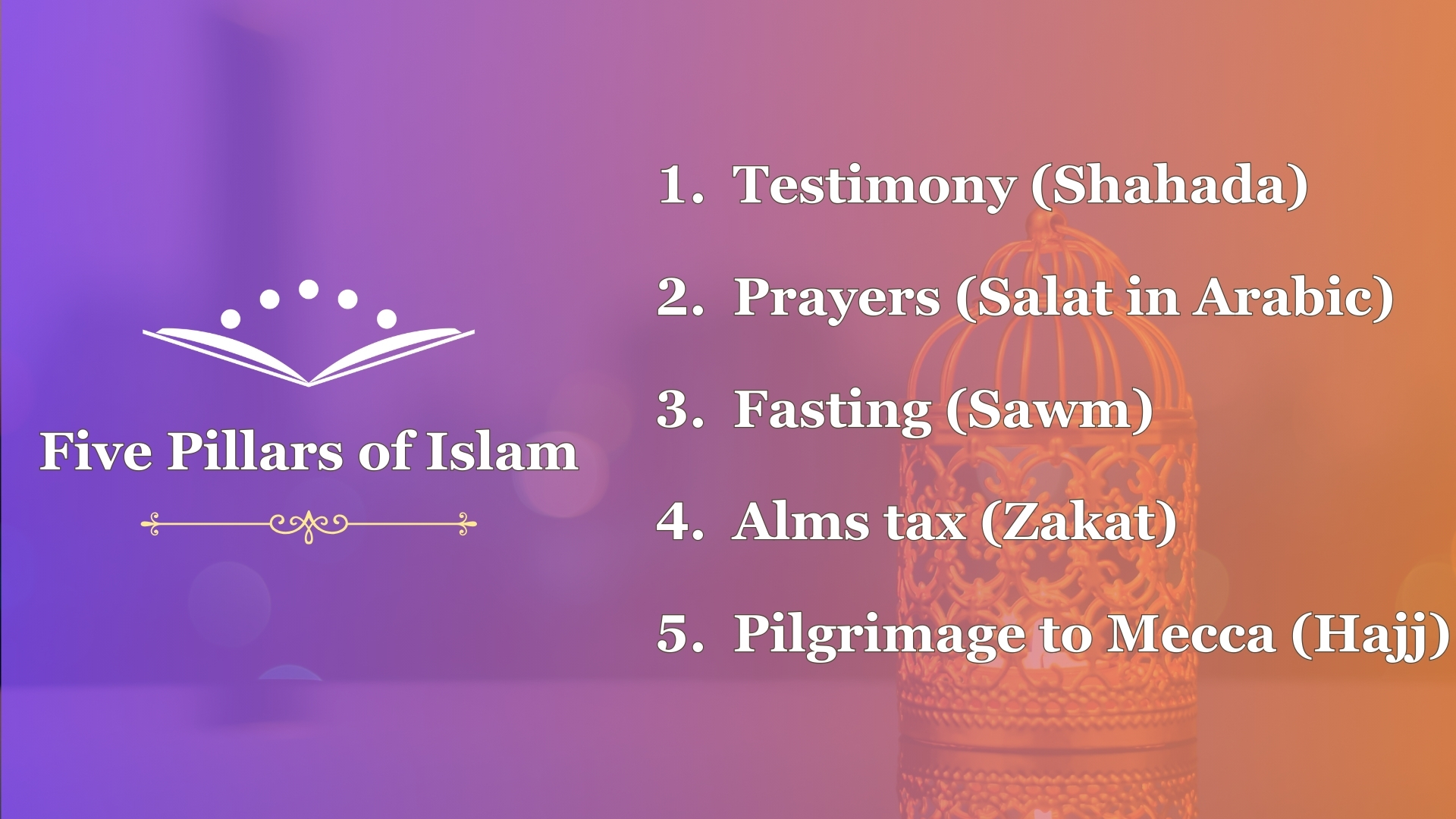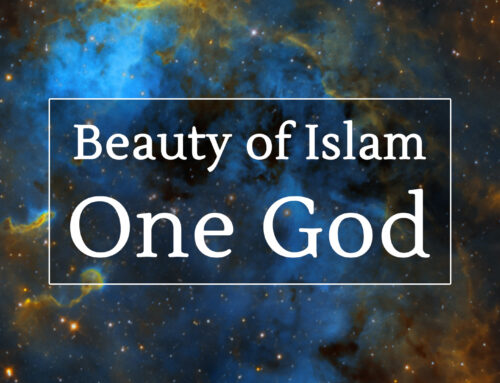Five Pillars of Islam
Islam obligates five acts of worship which forms the foundation of Islamic practice, they are known as the five pillars of Islam. These pillars help a believer to submit himself to God, develop self-discipline, best character, social responsibility, spiritually, and build a relationship with his Lord. These pillars are as follows,
1 Testimony (Shahada)
Also known as ‘shahada’ it is a testimony that bears witness and affirms the belief that “There is no God worthy of worship except Allah (God), and Muhammad is His Messenger and Servant.”
The first part of this affirmation deals with monotheism and this is the core principle of Islam. Associating anybody or anything with God is idolatry and is unacceptable and an unforgivable sin.
In this connection the Qur’an says:
“Indeed, Allāh does not forgive association with Him, but He forgives what is less than that for whom He wills. And he who associates others with Allāh has certainly fabricated a tremendous sin.” (4.:48)
When we firmly believe that there is no one worthy of worship – we in essence accept that – God is the Creator of everything that exists. God is the Sovereign and He is the disposer of all affairs, and He is the only one worthy of worship.
The second part of the affirmation states that Muhammad (PBUH) is God’s Messenger and Slave. This affirmation clearly indicates that he was also a human and a worshipper of God. It is also implied that since Muhammad is the Messenger of God, it is incumbent upon a believer to trust Muhammad (PBUH) and obey all his instructions.
“O you who have believed, respond to Allāh and to the Messenger when he calls you to that which gives you life…..” (8:24)
2 Prayers (Salat in Arabic)
Salat means the offering of prayers to the One and Only God. This involves fixed physical postures which include standing, bowing, and prostrating in a particular order, requiring the recitation of some Qur’anic verses during the process. The prayer has to be offered five times a day at fixed timings and must be performed in accordance with the instructions given by Prophet Muhammad (PBUH). The prayer keeps the remembrance of God alive in the hearts of believers throughout the day and night. Prayer is the best way to communicate with God and Islam gives us this opportunity five times a day. In prayers a believer converse with the Lord directly, seeking His forgiveness, help and guidance.
A believer pleads to God in every prayer,
“You alone we worship and to You alone we turn for help. Guide us to the straight path.” (1:5-6)
Muslims pray individually and in congregation in a mosque. Muslims of the entire world face Mecca while praying, and this way they unify their action in the same direction.
The five daily prayers are:
- Fajr: The early morning prayer –
- Zuhr: The early afternoon prayer –
- Asr: The late afternoon prayer –
- Maghrib: The sunset prayer –
- Isha: The night prayer –
Salat is the most basic act of expressing gratitude and submission to God and condition for success in this life and life after death. About Salat Quran says: “Successful indeed are the believers who are humble in their prayers.” (23:1-2)
Throughout the day a person is immersed with multiple necessary tasks and also with many activities just for relaxation. During the course of these activities, a person may face many harmful emotions like fatigue, greed, lust, anger, envy and so on. Prayer is a great tool for the believer to get the comfort and be steadfast. Through the prayers a believer keeps constant touch with his Lord – get rid of all negative feelings, reorient his attention towards the Lord again and get comfort and patience.
3 Fasting (Sawm)
It’s a religious obligation of every adult Muslim to fast from dawn to dusk during the month of Ramadan. However, people who are sick, elderly, or are travelers are exempted under the condition that they compensate for the lost days by fasting some other time of the year or they feed the poor.
During fasting, one must abstain from eating, drinking, and physical relations with one’s spouse. The purpose of fasting is to purify the soul, focus the mind towards worship and to increase one’s piety and devotion to God.
Fasting is an act of self-control and discipline, and it teaches Muslims how to be patient and humble, it also helps them to understand what it feels like to be hungry and thirsty. On the outer side fasting teaches to control and win over hunger, thirst, physical pleasure, while from the inner dimension it teaches to refrain from all weaknesses of the heart like craving for pleasure, lust, greed, envy, and backbiting.
It is said in the Holy Quran:
“Oh, you who believe! Fasting is prescribed to you as it was prescribed to those before you, that you may learn piety and righteousness” (Q 2:183)
4 Alms tax (Zakat)
This is the fourth pillar of Islam. It is obligatory on every adult Muslim to donate 2.5% of his or her surplus wealth (savings) over which one lunar year has passed to the needy, destitute, and poor people in the community. The word ‘zakat’ means ‘to purify’. So, by paying zakat, a Muslim is purifying his or her wealth. The underlying motive of zakat is to encourage the concept of charity thereby helping one to overcome greed, hoarding instincts, and attachment to wealth and worldly possessions. Zakat is paid on assets like jewelry, monetary savings, investment in shares, bonds, agricultural products, business stock and properties excluding a primary dwelling place.
Alms tax is one of the five pillars of Islam, and it is mandatory for all Muslims who are able to do so. The purpose of charity is to help those who are in need, and it is an act of worship that pleases Allah. This obligation serves as social support for poor Muslims.
It is said in the Holy Quran:
“The righteous (people) are those who spend their money during times of both ease and hardship, who restrain their anger and pardon people – Allah loves the charitable.” (Q 3:134)
Prophet Muhammad (PBUH), said: “Do not show lethargy or negligence in giving alms and charity till your last breath.” – (Bukhari and Muslim)
5 Pilgrimage to Mecca (Hajj)
Visiting Mecca for performing Hajj at least once in a lifetime is the fifth obligatory duty of a Muslim. However, this must be fulfilled only if one is in a position to afford the journey financially, if they are physically able to do so and all basic needs of one’s family are secured. If a Muslim does not have sufficient means to fulfill this obligation, he or she is exempt.
For Muslims the Hajj is an extra ordinary spiritual experience that benefits them in many ways. It can also be an opportunity to learn more about the history of Islam and to strengthen ties between Muslims from different countries. It is a time for Muslims to reflect on their faith and become closer to God.
“Proclaim to the people the ḥajj [pilgrimage]; they will come to you on foot and on every lean camel; they will come from every distant pass.” 22:27
In conclusion, five pillars of Islam are a source of guidance and strength for Muslims. From recognizing God as the only deity worthy of worship to prayer, charity, fasting during Ramadan, and pilgrimage; these pillars help shape life of Muslims.
With this we have come the end of today’s discussion, we will bring you more talks about the Quran, so keep visiting us and do not forget to subscribe our channel and press the bell sign, so you get the notification for all new videos.
If you want to read the Quran in your own language, you may download it free from our website www.quranforhumanity.org We have more than one hundred translations of the Quran in different languages. May guidance and peace be upon entire humanity.
qfh











